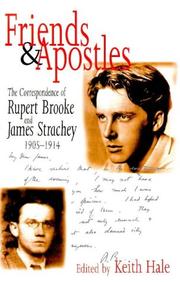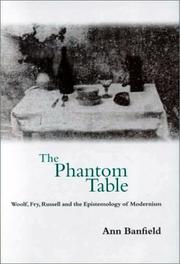| Listing 1 - 7 of 7 |
Sort by
|

ISBN: 0300070047 Year: 1998 Publisher: London New Haven Yale university press
Abstract | Keywords | Export | Availability | Bookmark
 Loading...
Loading...Choose an application
- Reference Manager
- EndNote
- RefWorks (Direct export to RefWorks)
Strachey, James --- Brooke, Rupert --- Bloomsbury [Groep van ] --- Bloomsbury [Groupe de ] --- Bloomsbury group --- Correspondence --- Poets [English ] --- 20th century --- Translators --- Cambridge Apostles (Society)
Book
ISBN: 0947728139 9780947728137 Year: 1985 Publisher: London Royce
Abstract | Keywords | Export | Availability | Bookmark
 Loading...
Loading...Choose an application
- Reference Manager
- EndNote
- RefWorks (Direct export to RefWorks)
Cambridge Apostles (Society) --- History --- England --- Intellectual life --- 19th century --- 20th century --- England - Intellectual life - 19th century --- England - Intellectual life - 20th century
Book
ISBN: 0297775766 Year: 1979 Publisher: London : George Weidenfeld & Nicolson,
Abstract | Keywords | Export | Availability | Bookmark
 Loading...
Loading...Choose an application
- Reference Manager
- EndNote
- RefWorks (Direct export to RefWorks)
Philosophers --- -Scholars --- Biography --- Moore, G. E. --- Cambridge Apostles (Society) --- Cambridge Conversazione Society --- Cambridge (England) --- -England --- Intellectual life --- -Philosophers --- -Biography --- Moore, George Edward, --- Mūra, Jī. Ī., --- England --- Cambridge (Cambridgeshire) --- Jianqiao (England) --- Intellectual life. --- Moore (george edward)
Book
ISBN: 3846765708 Year: 2020 Publisher: Paderborn Brill | Fink
Abstract | Keywords | Export | Availability | Bookmark
 Loading...
Loading...Choose an application
- Reference Manager
- EndNote
- RefWorks (Direct export to RefWorks)
Was wusste Wittgenstein von Hegels Philosophie und wie verhält sich sein Denken zu demjenigen Hegels? Antwort auf diese Fragen sucht die vorliegende Studie in einer aufmerksamen Rekonstruktion der verschiedenen Bemerkungen Wittgensteins zu Hegel. In einer späten Bemerkung bringt Wittgenstein das Verhältnis seiner eigenen Philosophie zu derjenigen Hegels auf den Punkt: »Mir scheint, Hegel will immer sagen, daß Dinge, die verschieden aussehen, in Wirklichkeit gleich sind, während es mir um den Nachweis geht, daß Dinge, die gleich aussehen, in Wirklichkeit verschieden sind. «Um besser verstehen zu können, was er dabei im Sinn hatte, werden die verschiedenen Bemerkungen Wittgensteins zu Hegel in den Kontext der Entwicklung seines philosophischen Denkens gestellt, und es wird - auch ganz in Wittgensteins Sinne - weitergefragt, was dieses Denken mit der philosophischen Tradition verbindet.
Philosophiegeschichte --- Geschichte der analytischen Philosophie --- Metaphilosophie --- deutscher Idealismus --- britischer Hegelianismus --- philosophische Exoterik --- Cambridge Apostles --- Morals Science Club --- Disputatio --- Tractatus logico-philosophicus --- History of philosophy --- history of analytical philosophy --- metaphilosophy --- German idealism --- British Hegelianism --- philosophical exotericism --- Wittgenstein, Ludwig, --- Hegel, Georg Wilhelm Friedrich,

ISBN: 0521773474 9780521034036 Year: 2000 Publisher: Cambridge Cambridge university press
Abstract | Keywords | Export | Availability | Bookmark
 Loading...
Loading...Choose an application
- Reference Manager
- EndNote
- RefWorks (Direct export to RefWorks)
Aesthetics, British. --- Bloomsbury group. --- Knowledge, Theory of, in literature. --- Modernism (Literature) --- Philosophy in literature. --- Reality in literature. --- Aesthetics, British --- Bloomsbury group --- Knowledge, Theory of, in literature --- Philosophy in literature --- Reality in literature --- 820 "19" --- Bloomsberries --- Arts, English --- Authors, English --- English literature --- Philosophy, English --- Aesthetics, English --- British aesthetics --- English aesthetics --- 820 "19" Engelse literatuur--20e eeuw. Periode 1900-1999 --- Engelse literatuur--20e eeuw. Periode 1900-1999 --- Fry, Roger, --- Moore, G. E. --- Russell, Bertrand --- Woolf, Virginia, --- Woolf, Virginia Stephen, --- Stephen, Virginia, --- Ulf, Virzhinii︠a︡, --- Ṿolf, Ṿirg'inyah, --- Vulf, Virdzhinii︠a︡, --- Вулф, Вирджиния, --- וולף, וירג׳יניה --- וולף, וירג׳יניה, --- Stephen, Adeline Virginia, --- Moore, George Edward, --- Mūra, Jī. Ī., --- Fry, Roger Eliot, --- פריי, רוג׳ר אליוט, --- Influence. --- Philosophy. --- Cambridge Apostles (Society) --- Cambridge Conversazione Society --- Woolf, Virginia --- Fry, R. E. --- Fry, Roger E. --- Fry, Roger
Book
ISBN: 0691229287 Year: 2005 Publisher: Princeton, N.J. : Princeton University Press,
Abstract | Keywords | Export | Availability | Bookmark
 Loading...
Loading...Choose an application
- Reference Manager
- EndNote
- RefWorks (Direct export to RefWorks)
For centuries, southern Europe, and Italy in particular, has offered writers far more than an evocative setting for important works of literature. The voyage south has been an integral part of the imagination of inspiration. Haunted Museum is a groundbreaking, in-depth look at fantasies of Italy from the late eighteenth to the early twentieth centuries, focusing on a literary tradition Jonah Siegel terms the "art romance"--the fantastic voyage south understood as the register of an ambivalent desire for art and a heightened experience of reality. Siegel argues that Italy's allure derives not only from its celebrated promise of unique natural beauty and prized antiquities, but from the opportunity it offers writers to place themselves in relation to a web of prior accounts of travel to the native land of genius. Beginning with Goethe as the founding figure of the tradition, Haunted Museum moves from a rich reframing of literature from the first half of the nineteenth century--including new readings of works by Byron, de Staël, Barrett Browning, and others--to an ambitious examination of Henry James's well-known engagement with Europe, newly understood as a response to this important literary legacy. Readings of works by Freud, Forster, Mann, and Proust demonstrate the longevity of the tradition of looking to Italy for the representation of desires as impossible to satisfy as they are to deny.
Travel in literature. --- Artists in literature. --- Art in literature. --- Romanticism. --- Literature, Modern --- History and criticism. --- Italy. --- Italy --- In literature. --- Amend-Söchting, Anne. --- American in Paris (Minnelli). --- Antiochus. --- Beckett, Ernest William. --- Bildung. --- Borghese Gladiator. --- British Museum. --- Buzard, James. --- Cambridge Apostles. --- Castiglione, Giuseppe. --- Countess of Blessington. --- Curran, Stuart. --- Dowling, Linda. --- Eliot, George. --- Farnese Hercules. --- Fowler, Alastair. --- Frye, Northrop. --- Giorcelli, Cristina. --- Gordon, Lyndall. --- Gradiva (Jensen). --- Hannibal (Harris). --- Hard Facts (Fisher). --- Highsmith, Patricia. --- Inglesfield, Robert. --- Italian Hours (James). --- Italian Journey (Goethe). --- Jensen, Wilhelm. --- Kilmartin, Terence. --- Korte, Barbara. --- Kronos. --- Lean, David. --- Loch Ness Monster. --- Lootens, Tricia. --- Mann, Thomas. --- Maximus, Valerius. --- Minnelli, Vincente. --- Munthe, Malcolm. --- Oedipal passion. --- Parthenon. --- art romance. --- derealization. --- disincarnation. --- escapism. --- genius. --- ghosts. --- location. --- masochism. --- melancholy. --- natural beauty. --- novelty. --- originality. --- origins. --- paternity.
Book
ISBN: 1782046062 1783270462 Year: 2015 Publisher: Woodbridge, Suffolk, UK : The Boydell Press,
Abstract | Keywords | Export | Availability | Bookmark
 Loading...
Loading...Choose an application
- Reference Manager
- EndNote
- RefWorks (Direct export to RefWorks)
In the early modern period the subject of knowledge was dogma. Early modern knowledge was often tied to confessional tests and state-building. One road to modernity could be read as escape from institutional and confessional restraints to the freedom of reason. A second one could be read as escape to networks of association and belonging. In the nineteenth century, the latter space was filled in Britain by learned societies (within or outside universities) or even clubs. It was a movement toward a different kind of method and a different kind of learning. Learned societies and clubs became contested sites in which a new kind of identity was created: the charisma and persona of the scholar, of the intellectual. The history of cognition in nineteenth-century Britain became a history of various intellectual enclaves and the people who occupied them. This book examines the nature of knowledge in nineteenth-century Britain and the role of learned societies, clubs and coteries in its formation, organization and dissolution. Drawing on numerous, unpublished, private papers and manuscripts, it looks predominantly at societies in the metropolitan centres of London, Oxford and Cambridge. It also takes up the relation of British styles of learning, in contrast to Continental forms, which aimed to produce people of culture and character suited for positions of public authority. While the British owed much to German exemplars, a tension in these intellectual exchanges remained, magnified by the Great War. The study concludes by comparing British cognitive niches with similar social formations in Germany, France and the United States. William C. Lubenow is Distinguished Professor of History at Stockton College of New Jersey. His previous books include Liberal Intellectuals and Public Culture in Modern Britain (Boydell, 2010), The Cambridge Apostles, 1820-1914 (1998) and Parliamentary Politics and the Home Rule Crisis (1988). He has been president of the North American Conference on British Studies.
Learned institutions and societies --- History --- Academies (Learned societies) --- Learned societies --- Scholarly societies --- Associations, institutions, etc. --- 1800-1899 --- Great Britain. --- Anglia --- Angliyah --- Briṭanyah --- England and Wales --- Förenade kungariket --- Grã-Bretanha --- Grande-Bretagne --- Grossbritannien --- Igirisu --- Iso-Britannia --- Marea Britanie --- Nagy-Britannia --- Prydain Fawr --- Royaume-Uni --- Saharātchaʻānāčhak --- Storbritannien --- United Kingdom --- United Kingdom of Great Britain and Ireland --- United Kingdom of Great Britain and Northern Ireland --- Velikobritanii͡ --- Wielka Brytania --- Yhdistynyt kuningaskunta --- Northern Ireland --- Scotland --- Wales --- British styles of learning. --- Cambridge. --- Continental forms. --- Distinguished Professor of History. --- France. --- German exemplars. --- Germany. --- Great War. --- Learned societies. --- Liberal Intellectuals and Public Culture in Modern Britain. --- London. --- North American Conference on British Studies president. --- Oxford. --- Parliamentary Politics and the Home Rule Crisis. --- Stockton College of New Jersey. --- The Cambridge Apostles, 1820-1914. --- United States. --- William C. Lubenow. --- charisma. --- clubs. --- cognition. --- cognitive niches. --- confessional tests. --- freedom of reason. --- identity. --- intellectual enclaves. --- intellectual. --- knowledge. --- learning. --- method. --- modernity. --- networks of association. --- nineteenth-century Britain. --- public authority. --- scholar. --- state-building.
| Listing 1 - 7 of 7 |
Sort by
|

 Search
Search Feedback
Feedback About
About Help
Help News
News